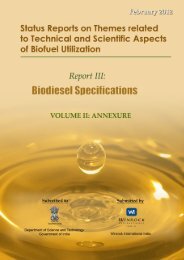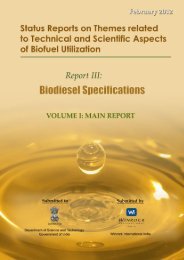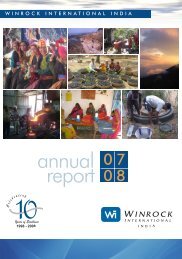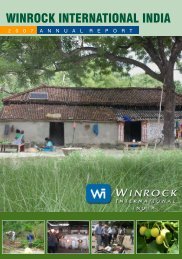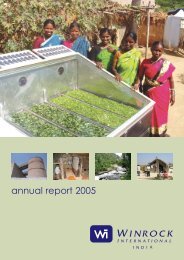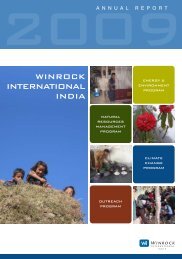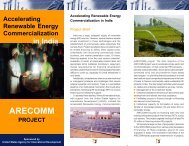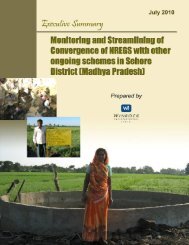IssuE 8 â ApRIl â JuNE 2011 - Winrock International India
IssuE 8 â ApRIl â JuNE 2011 - Winrock International India
IssuE 8 â ApRIl â JuNE 2011 - Winrock International India
You also want an ePaper? Increase the reach of your titles
YUMPU automatically turns print PDFs into web optimized ePapers that Google loves.
Policy perspective<br />
primarily focused on supply-side<br />
push. On supply side, since most<br />
biomass are home grown or gathered<br />
by households for own needs, the<br />
market for biomass energy needs to be<br />
developed, both in ensuring economic<br />
and sustainable production as well as<br />
in promoting efficient use. Under the<br />
circumstance, organized technological<br />
intervention in biomass production is<br />
also required.<br />
The most vital issue for biomass<br />
energy in <strong>India</strong> and Thailand is the<br />
development of market for energy<br />
services. Two possible ways of doing<br />
this would be: i) providing reliable<br />
and enhanced biomass supply, and ii)<br />
reliable energy services with biomass<br />
technologies at competitive cost.<br />
The main objectives of the policy<br />
of Thailand on power purchase<br />
from SPPs are to promote the use<br />
of indigenous by-product energy<br />
sources and non-conventional energy<br />
for power generation, e.g. wind,<br />
solar, geothermal, waste and waste<br />
agriculture, and economical and<br />
efficient use of energy, to encourage<br />
participation of private sectors in<br />
power generation by allowing them<br />
to generate and sell electricity to<br />
the power utilities, and to promote<br />
competition in the power-generation<br />
sector by authorizing private power<br />
producers to supply electricity directly<br />
to industries and nearby residential<br />
customers. Consumers are, therefore,<br />
given more options on which<br />
electricity is traded.<br />
However, there are certain challenges<br />
that need to be focused upon like high<br />
investment cost for modern biomass<br />
technologies. Due to inconvenience<br />
caused by power plant set-up people<br />
don’t want any new power plant in<br />
their area. There is a high requirement<br />
of research personnel in the area of<br />
thermal conversion. The conversion<br />
efficiency in utilizing biomass as an<br />
energy source is generally low. At<br />
present, technologies that utilized<br />
biomass are ranked from local made<br />
to imported technology and many<br />
biomass technologies especially in<br />
rural use and some factories are<br />
classified to be quite an old technology<br />
with low efficiency. So there are<br />
enormous rooms for promoting an<br />
efficient and most promising biomass<br />
technology, especially biomass<br />
gasification technology to replace the<br />
old one.<br />
The future prospects of biomass<br />
technologies depend considerably<br />
on removing existing barriers. The<br />
key issue before the <strong>India</strong>n policy<br />
makers is to develop the market for<br />
biomass energy services by ensuring<br />
reliable and enhanced biomass supply,<br />
removing tariff distortions favoring<br />
fossil fuels and producing energy<br />
services reliably with modern biomass<br />
technologies at competitive cost.<br />
Biomass power is a major contributor<br />
to domestic and international energy<br />
needs while providing substantial<br />
environmental benefits. It is one<br />
essential source of energy for<br />
production particularly for saving the<br />
environment.<br />
References<br />
[1] Effect of Energy Policy on<br />
Biomass-based Power Generation<br />
in Thailand, Surin Ngaemngam<br />
and Tetsuo Tezuka , Graduate<br />
School of Energy Science, Kyoto<br />
University, Japan, The 2nd<br />
Joint <strong>International</strong> Conference<br />
on “Sustainable Energy and<br />
Environment (SEE 2006)” 21-23<br />
November 2006.<br />
[2] Thailand biomass-based power<br />
generation and cogeneration<br />
within small rural industries<br />
(final report), Black & Veatch<br />
(Thailand), November 2000.<br />
[3] Status of SPPs, Electric<br />
Generation Authority of Thailand<br />
(EGAT) July 2006, www.egat.com<br />
[4] Department of Industrial Works,<br />
www.diw.go.th/diw/query.asp<br />
[5] Current energy situation in<br />
Thailand 2004, Energy Policy and<br />
Planning Office (EPPO), Ministry<br />
of Energy, (p.34)<br />
[6] Status of VSPPs, Energy Policy<br />
and Planning Office (EPPO),<br />
April 2006,www.eppo.go.th/<br />
index-T.html<br />
[7] http://www.e2analytics.com<br />
[8] Wood Energy and Global Climate<br />
Change, Wood Energy News,<br />
FAO/RWEDP, P.R. Shukla, Vol.11,<br />
No.4, Bangkok, 1996.<br />
[9] The Modelling of Policy Options<br />
for Greenhouse Gas Mitigation<br />
in <strong>India</strong> AMBIO, P.R. Shukla, Vol.<br />
XXV, No. 4, June, 240-248, 1996.<br />
[10] Biomass Energy in <strong>India</strong>: Policies<br />
and Prospects, P.R. Shukla, Paper<br />
presented at the workshop on<br />
Biomass Energy: Key Issues and<br />
Priority Needs Organized by<br />
<strong>International</strong> Energy Agency<br />
(IEA) Paris.<br />
[11] Biomass Gasification:<br />
Environmentally Sound<br />
Technology for Decentralized<br />
Power Generation: A Case Study<br />
from <strong>India</strong>, N.H.Ravindranath,<br />
Biomass and Bioenergy, 1993.<br />
[12] Thailand’s Biomass Energy,<br />
Phongjaroon Srisovanna, Chief<br />
Country Coordinator COGEN<br />
3 Energy Conservation Center<br />
of Thailand, Electricity Supply<br />
Industry in Transition: Issues and<br />
Prospect for Asia 14-16 January<br />
2004.<br />
Courtesy: WII Editorial Team<br />
April-June <strong>2011</strong><br />
29




